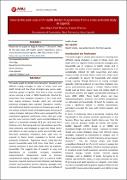| dc.contributor.author | Aliga, Alex | |
| dc.contributor.author | Matovu, Fred | |
| dc.contributor.author | Wasswa, Francis | |
| dc.date.accessioned | 2024-03-07T20:38:56Z | |
| dc.date.available | 2024-03-07T20:38:56Z | |
| dc.date.issued | 2023 | |
| dc.identifier.citation | Aliga A, Matovu F, & Wasswa F. (2023). How do the poor cope with health shocks? Experiences from a cross-sectional study in Uganda. Australasian Medical Journal, 16(4):611-624. https://doi.org/10.21767/AMJ.2022.3935 | en_US |
| dc.identifier.issn | 1836-1935 | |
| dc.identifier.uri | http://dir.muni.ac.ug/xmlui/handle/20.500.12260/620 | |
| dc.description.abstract | This study sought to identify determinants in choosing from different coping strategies in cases of illness, injury and death shocks and how these strategies vary across socioeconomic groups in Uganda. Data from a cross sectional survey covering a total of 1496 households collected by researchers from Makerere University in 2012 was used. Four coping strategies, besides social and non-social protection strategies were explored. Descriptive statistics and multinomial logistic regression techniques were used in the analysis of health shocks and determinants of choices of coping strategies. Marginal effects were computed for the multinomial regression coefficients. Illness (83.9 per cent) was the most common health shock reported followed by death of a household member (25.8 per cent) and injury (15.8 per cent). Borrowing and external assistance were the most commonly used strategies to cope with illness shocks and reliance on own savings or assets was minimally used. Non-social protection initiatives2 were used most to respond to illness shocks compared to formal social protection initiatives3. Regression results shows that the poorest households were 0.28 times more likely to seek external assistance to deal with shocks than the wealthier households. This suggests lack of capacity to cope and dependence on unreliable strategies exacerbate impoverishment. Governments needs to promote comprehensive coping strategies such as universal health insurance, targeted social protection initiatives and develop inclusive and innovative poverty reduction strategies that enhance the capability of households to cope with effects of health shocks. | en_US |
| dc.language.iso | en | en_US |
| dc.publisher | Australasian Medical Journal | en_US |
| dc.subject | Health Shocks | en_US |
| dc.subject | Coping Mechanism | en_US |
| dc.subject | the Poor | en_US |
| dc.subject | Uganda | en_US |
| dc.title | How do the poor cope with health shocks? Experiences from a cross-sectional study in Uganda | en_US |
| dc.type | Article | en_US |

